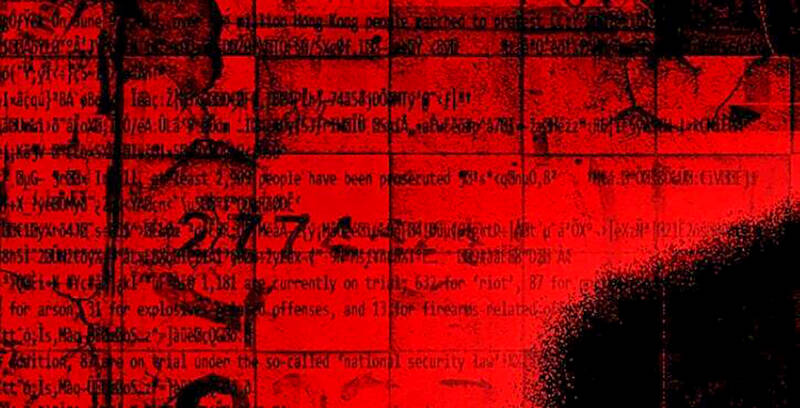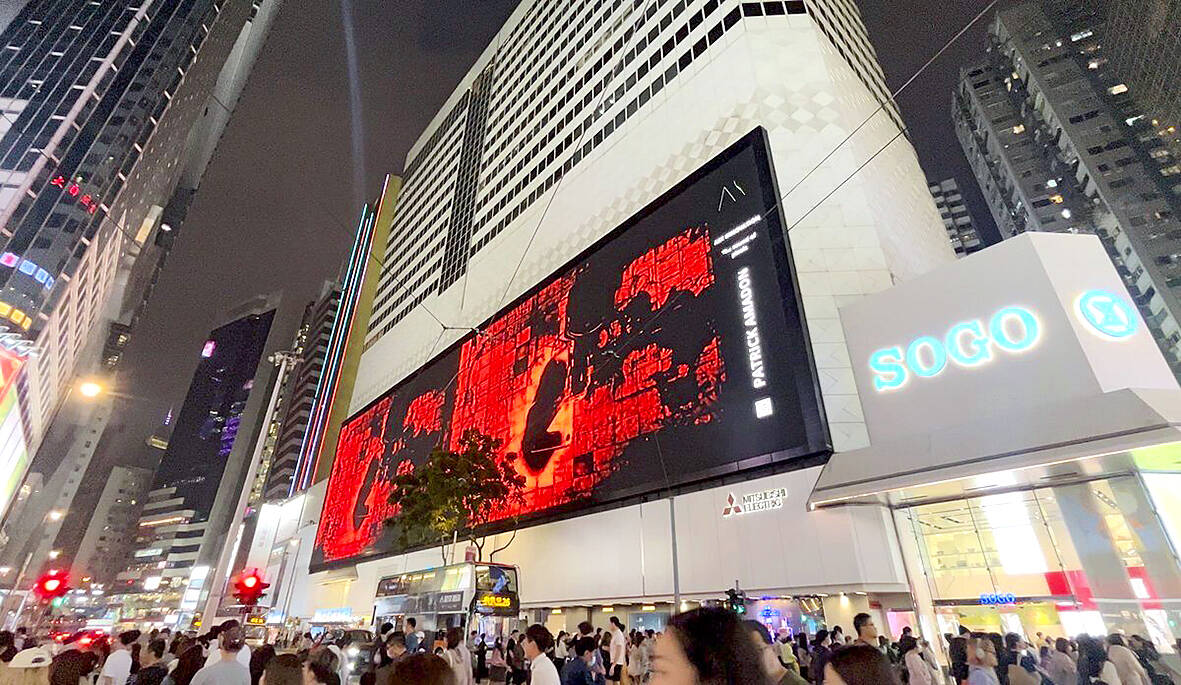A Hong Kong department store took down a digital artwork that contained hidden references to jailed dissidents, in an incident the artist says is evidence of erosion of free speech in the semi-autonomous Chinese city.
It was unclear whether the government played a role in the decision to remove the artwork, it came just days after a slasher film featuring Winnie the Pooh, a figure often used in playful taunts of China’s President Xi Jinping (習近平), was pulled from local cinemas.
Patrick Amadon’s No Rioters was put on display on a billboard at the SOGO Causeway Bay Store for an exhibition that started last Friday, as the city was promoting its return as a vibrant cultural hub following years of pandemic travel restrictions. Art Basel Hong Kong, a prominent art fair in Asia, began this week, alongside other art events.

Photo: AP
Hong Kong is a former British colony that returned to China’s rule in 1997, promising to retain its Western-style freedoms. The city was rocked by a massive pro-democracy protest movement in 2019, which ended after China imposed a “National Security Law” that criminalized much dissent. The city’s government has since jailed and silenced many activists.
Amadon said he had followed the protests in Hong Kong closely, and he wanted his work to show solidarity with the protesters and remind people about the new reality of the city.
“It was too much watching Art Week in Hong Kong pretend the Chinese government didn’t crush a democracy and turn Hong Kong into a vassal surveillance state... because it’s a convenient location for a good market,” the Los Angeles-based artist said.

Photo: AP
Amadon said he knew the work would be controversial and was surprised it had been displayed in public for days. It featured a panning surveillance camera.
Flashes of Matrix-like text showcased the names and prison sentences of convicted activists and other prominent figures in the pro-democracy movement, including legal scholar Benny Tai (戴耀廷) and former student leader Joshua Wong (黃之鋒), who were both charged with subversion in the biggest case brought under the National Security Law.
These details were shown too fast to be seen by the naked eyes Amadon said, but viewers could see the details if they used a camera to capture stills. It also referred to journalist-turned activist Gwyneth Ho (何桂藍) who was assaulted when she was live-streaming a mob attack in July 2019 during the massive protests sparked by an extradition bill.
The gallery that arranged the exhibit did not know whether the government ordered the work taken down, Francesca Boffetti, CEO at Art Innovation Gallery said in an e-mail.
“Our intermediary told us that the owners of SOGO were concerned about the sensitive political content hidden behind Patrick’s work, so they decided to remove the work from the exhibition immediately,” Boffetti said.
No one mentioned any law or threatened them with fines, she added, but SOGO’s legal team asked the gallery whether it was aware of the content and message of Amadon’s work.
Local police and SOGO did not immediately respond to a request for comment. The Culture, Sports and Tourism Bureau said that it did not contact SOGO.
Amadon said the gallery told him in an urgent call that it was very concerned about its legal exposure after a conversation with SOGO.
Since the passage of the National Security Law, the city’s art and media communities have learned to be wary of crossing vaguely defined red lines. Pro-democracy newspaper Apple Daily was forced to close after authorities arrested its top editors and executives and accused them of foreign collusion. Some artists known for their political work left Hong Kong under the shadow of the law. Some filmmakers have stopped showing their work in the city. Even those producing non-political content have become cautious. But the government insisted that its residents continue to enjoy promised freedoms after the enactment of the law.
Amadon said what happened to his work showed that the city had lost its freedom of expression and artistic freedom.
“This objectively shows that they are no longer here in the same way that they once were,” he said. “From a narrative standpoint, I mean, it did have to get censored and taken down, I feel like, to be a completed piece.”

No one saw it coming. Everyone — including the Chinese Nationalist Party (KMT) — expected at least some of the recall campaigns against 24 of its lawmakers and Hsinchu Mayor Ann Kao (高虹安) to succeed. Underground gamblers reportedly expected between five and eight lawmakers to lose their jobs. All of this analysis made sense, but contained a fatal flaw. The record of the recall campaigns, the collapse of the KMT-led recalls, and polling data all pointed to enthusiastic high turnout in support of the recall campaigns, and that those against the recalls were unenthusiastic and far less likely to vote. That

Behind a car repair business on a nondescript Thai street are the cherished pets of a rising TikTok animal influencer: two lions and a 200-kilogram lion-tiger hybrid called “Big George.” Lion ownership is legal in Thailand, and Tharnuwarht Plengkemratch is an enthusiastic advocate, posting updates on his feline companions to nearly three million followers. “They’re playful and affectionate, just like dogs or cats,” he said from inside their cage complex at his home in the northern city of Chiang Mai. Thailand’s captive lion population has exploded in recent years, with nearly 500 registered in zoos, breeding farms, petting cafes and homes. Experts warn the

A couple of weeks ago the parties aligned with the People’s Republic of China (PRC), the Chinese Nationalist Party (KMT) and the Taiwan People’s Party (TPP), voted in the legislature to eliminate the subsidy that enables Taiwan Power Co (Taipower) to keep up with its burgeoning debt, and instead pay for universal cash handouts worth NT$10,000. The subsidy would have been NT$100 billion, while the cash handout had a budget of NT$235 billion. The bill mandates that the cash payments must be completed by Oct. 31 of this year. The changes were part of the overall NT$545 billion budget approved

The unexpected collapse of the recall campaigns is being viewed through many lenses, most of them skewed and self-absorbed. The international media unsurprisingly focuses on what they perceive as the message that Taiwanese voters were sending in the failure of the mass recall, especially to China, the US and to friendly Western nations. This made some sense prior to early last month. One of the main arguments used by recall campaigners for recalling Chinese Nationalist Party (KMT) lawmakers was that they were too pro-China, and by extension not to be trusted with defending the nation. Also by extension, that argument could be